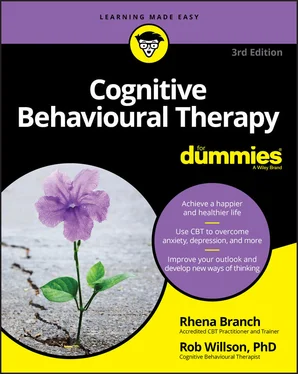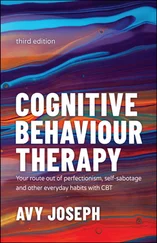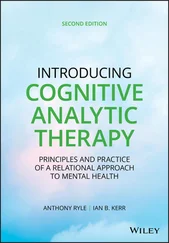1 ...6 7 8 10 11 12 ...22  All-or-nothing thinking can sabotage goal-directed behaviour. You’re far more likely to throw in the towel at the first sign of something blocking your goal when you refuse to allow a margin for error. Beware of ‘either/or’ statements and global labels such as ‘good’ and ‘bad’ or ‘success’ and ‘failure’. Neither people nor life situations are often that cut and dried.
All-or-nothing thinking can sabotage goal-directed behaviour. You’re far more likely to throw in the towel at the first sign of something blocking your goal when you refuse to allow a margin for error. Beware of ‘either/or’ statements and global labels such as ‘good’ and ‘bad’ or ‘success’ and ‘failure’. Neither people nor life situations are often that cut and dried.
Fortune-Telling: Stepping Away From the Crystal Ball
Often, clients tell us after they’ve done something they were anxious about that the actual event wasn’t half as bad as they’d predicted. Predictions are the problem here. You probably don’t possess extrasensory perceptions that allow you to see into the future. You probably can’t see into the future even with the aid of a crystal ball like the one in Figure 2-3. And yet, you may try to predict future events. Unfortunately, the predictions you make may be unduly negative:

© John Wiley & Sons, Inc.
FIGURE 2-3:Fortune-telling.
You’ve been feeling a bit depressed lately and you aren’t enjoying yourself like you used to. Someone from work invites you to a party, but you decide that if you go you won’t have a good time. The food will unpalatable, the music will be irksome and the other guests are sure to find you boring. So, you opt to stay in and bemoan the state of your social life.
You fancy the bloke who sells you coffee every morning on the way to the office, and you’d like to go out with him on a date. You predict that if you ask him, you’ll be so anxious that you’ll say something stupid. Anyway, he’s bound to say no thanks – someone that attractive must surely be in a relationship.
You always thought that parkour would be fun, but you’ve got an anxious disposition. If you try the sport, you’re sure to lose your nerve at a crucial moment and just end up with a bruised ego and a physical injury.
 You’re better off letting the future unfold without trying to guess how it may turn out. Put the dustcover back on the crystal ball, flog the Ouija board on eBay, leave the tarot cards alone and try the following strategies instead:
You’re better off letting the future unfold without trying to guess how it may turn out. Put the dustcover back on the crystal ball, flog the Ouija board on eBay, leave the tarot cards alone and try the following strategies instead:
Test out your predictions. You really never know how much fun you might have at a party until you get there – and the food could be amazing. Maybe the chap at the coffee shop has got a partner, but you won’t be sure until you ask. To find out more about testing out your predictions, have a read through Chapter 4.
Be prepared to take risks. Isn’t it worth possibly sustaining a few bruises for the opportunity to try a sport you’ve always been interested in? And can’t you bear the possibility of appearing a trifle nervous for the chance to get to know someone you really like? There’s a saying that ‘a ship is safe in a harbour, but that’s not what ships are built for’. Learning to live experimentally and taking calculated risks is a recipe for keeping life interesting and rewarding.
Understand that your past experiences don’t determine your future experiences. Just because the last party you went to turned out to be a dreary homage to the seventies, the last person you asked out went a bit green, and that scuba-diving venture resulted in a severe case of the bends doesn’t mean that you’ll never have better luck again.
 Typically, fortune-telling stops you from taking action. It can also become a bit of a self-fulfilling prophecy. If you keep telling yourself that you won’t enjoy that party, you’re liable to make that prediction come true. Same goes for meeting new people and trying new things. So, get your party on, ask him out for a drink and turn up at your local parkour group! Laissez les bons temps rouler!
Typically, fortune-telling stops you from taking action. It can also become a bit of a self-fulfilling prophecy. If you keep telling yourself that you won’t enjoy that party, you’re liable to make that prediction come true. Same goes for meeting new people and trying new things. So, get your party on, ask him out for a drink and turn up at your local parkour group! Laissez les bons temps rouler!
Mind-Reading: Taking Your Guesses with a Pinch of Salt
So, you think you know what other people are thinking, do you? With mind-reading (see Figure 2-4), the tendency is often to assume that others are thinking negative things about you or have negative motives and intentions.
Here are some examples of mind-reading tendencies:
You’re chatting with someone, and he looks over your shoulder as you’re speaking, breaks eye contact and (perish the thought) yawns. You conclude immediately that the other person thinks your conversation is mind-numbing and that he’d rather be talking to someone else.© John Wiley & Sons, Inc. FIGURE 2-4:Mind-reading.
Your boss advises that you book some time off to use up your annual leave. You decide that he’s saying this because he thinks your work is rubbish and wants the opportunity to interview for your replacement while you’re on leave.
You pass a neighbour on the street. He says a quick hello but doesn’t look very friendly or pleased to see you. You think that he must be annoyed with you about your dog howling at the last full moon and is making plans to report you to environmental health.
You can never know for certain what another person is thinking, so you’re wise to pour salt on your negative assumptions. Stand back and take a look at all the evidence on hand. Take control of your tendency to mind-read by trying the following:
Generate some alternative reasons for what you see. The person you’re chatting with may be tired, be preoccupied with his own thoughts or just have spotted someone he knows.
Consider that your guesses may be wrong. Are your fears really about your boss’s motives, or do they concern your own insecurity about your abilities at work? Do you have enough information or hard evidence to conclude that your boss thinks your work is substandard? Does it follow logically that ‘consider booking time off’ means ‘you’re getting the sack’?
Get more information (if appropriate). Ask your neighbour whether your dog kept him up all night, and talk to your vet about ways to calm your pet next time the moon waxes.
 You tend to mind-read what you fear most. Mind-reading is a bit like putting a slide in a slide projector. What you project or imagine is going on in other people’s minds is very much based on what’s already in yours.
You tend to mind-read what you fear most. Mind-reading is a bit like putting a slide in a slide projector. What you project or imagine is going on in other people’s minds is very much based on what’s already in yours.
Emotional Reasoning: Reminding Yourself That Feelings Aren’t Facts
Surely we’re wrong about this one. Surely your feelings are real hard evidence of the way things are? Actually, no! Often, relying too heavily on your feelings as a guide leads you off the reality path. Here are some examples of emotional reasoning:
Your partner has been spending long nights at the office with a co-worker for the past month. You feel jealous and suspicious of your partner. Based on these feelings, you conclude that your partner’s having an affair with his co-worker.
You feel guilty out of the blue. You conclude that you must have done something wrong; otherwise, you wouldn’t be feeling guilty.
You wake up feeling anxious, with a vague sense of dread. You assume that there must be something seriously wrong in your life and search your mind frantically for the source of your ill- feeling.
Читать дальше

 All-or-nothing thinking can sabotage goal-directed behaviour. You’re far more likely to throw in the towel at the first sign of something blocking your goal when you refuse to allow a margin for error. Beware of ‘either/or’ statements and global labels such as ‘good’ and ‘bad’ or ‘success’ and ‘failure’. Neither people nor life situations are often that cut and dried.
All-or-nothing thinking can sabotage goal-directed behaviour. You’re far more likely to throw in the towel at the first sign of something blocking your goal when you refuse to allow a margin for error. Beware of ‘either/or’ statements and global labels such as ‘good’ and ‘bad’ or ‘success’ and ‘failure’. Neither people nor life situations are often that cut and dried.
 You’re better off letting the future unfold without trying to guess how it may turn out. Put the dustcover back on the crystal ball, flog the Ouija board on eBay, leave the tarot cards alone and try the following strategies instead:
You’re better off letting the future unfold without trying to guess how it may turn out. Put the dustcover back on the crystal ball, flog the Ouija board on eBay, leave the tarot cards alone and try the following strategies instead:










